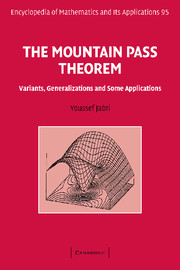Book contents
- Frontmatter
- Contents
- Introduction
- 1 Retrospective
- I First Steps Toward the Mountains
- 2 Palais-Smale Condition: Definitions and Examples
- 3 Obtaining “Almost Critical Points” – Variational Principle
- 4 Obtaining “Almost Critical Points” – The Deformation Lemma
- II Reaching the Mountain Pass Through Easy Climbs
- III A Deeper Insight in Mountains Topology
- IV The Landscape Becoming Less Smooth
- V Speculating about the Mountain Pass Geometry
- VI Technical Climbs
- A Background Material
- Bibliography
- Index
3 - Obtaining “Almost Critical Points” – Variational Principle
Published online by Cambridge University Press: 04 September 2009
- Frontmatter
- Contents
- Introduction
- 1 Retrospective
- I First Steps Toward the Mountains
- 2 Palais-Smale Condition: Definitions and Examples
- 3 Obtaining “Almost Critical Points” – Variational Principle
- 4 Obtaining “Almost Critical Points” – The Deformation Lemma
- II Reaching the Mountain Pass Through Easy Climbs
- III A Deeper Insight in Mountains Topology
- IV The Landscape Becoming Less Smooth
- V Speculating about the Mountain Pass Geometry
- VI Technical Climbs
- A Background Material
- Bibliography
- Index
Summary
Measuring instruments always have limited resolution. For this reason, in real world applications of mathematics, approximate solutions are often as good as, and frequently indistinguishable from, true solutions. Since mathematical laws governing real world situations are often in variational form, it is natural to develop a theory of “almost critical points”, and the paper under review can be regarded as an interesting and successful step in that direction.
From a Review of [I. Ekeland, On the variational principle. J. Math. Anal. Appl., 47, 324–353 (1974)] by R.S. Palais.In a substantial part of modern analysis characterized by the tendency to avoid differentiability assumptions, this principle will likely play at least the same role as, say, the contraction mapping principle plays in “smooth” analysis. The elegance of the proofs and the natural way the principle appears in them lend much support to this belief.
From a Review of [I. Ekeland, Nonconvex minimization problems. Bull. Am. Math. Soc., 1, 443–474 (1979)] by A.D. Ioffe.This principle discovered in 1972 has found a multitude of applications in different fields of Analysis. It has also served to provide simple and elegant proofs of known results. And as we see, it is a tool that unifies many results where the underlying idea is some sort of approximation.
D.G. de Figueiredo, Lectures on the Ekeland variational principle with applications and detours, Springer-Verlag, 1981.- Type
- Chapter
- Information
- The Mountain Pass TheoremVariants, Generalizations and Some Applications, pp. 22 - 32Publisher: Cambridge University PressPrint publication year: 2003



